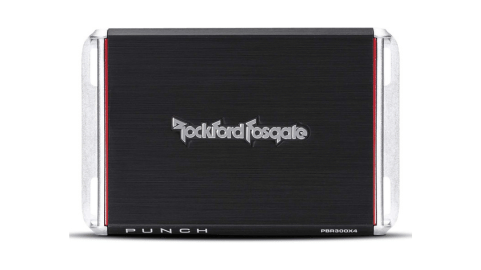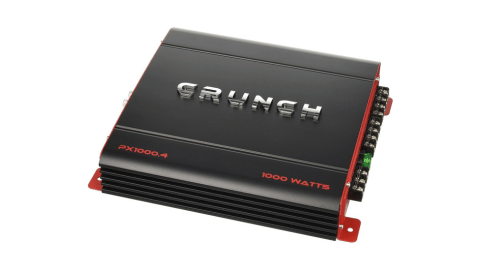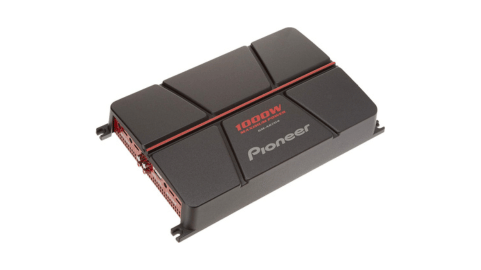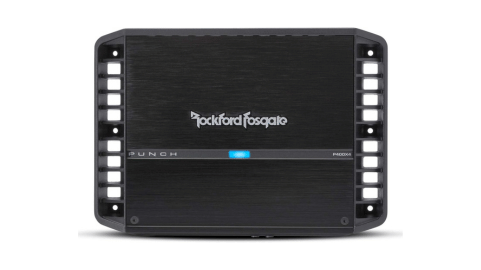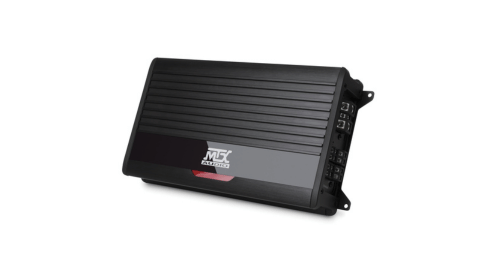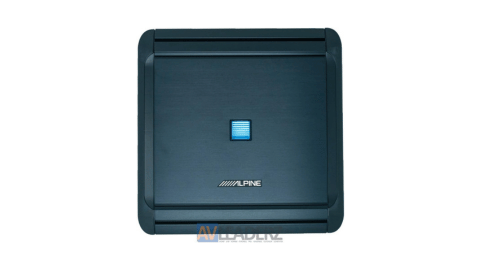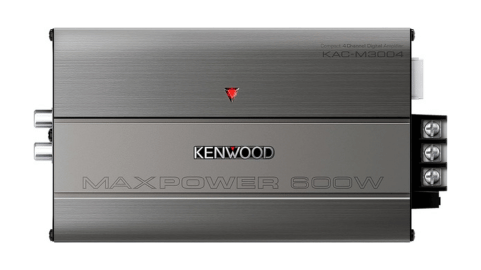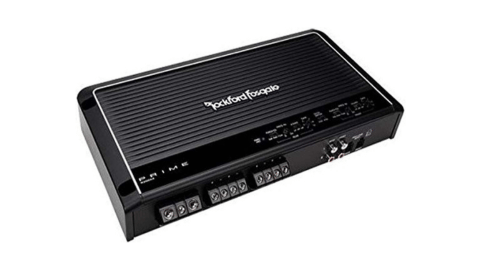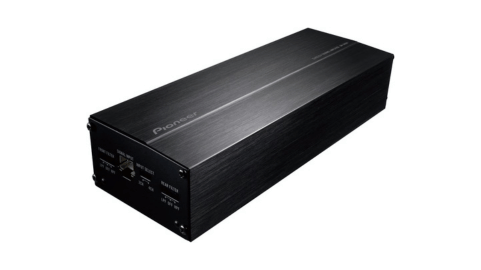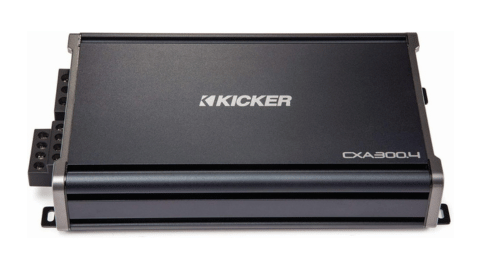Amplify your sound system with a powerful 4-channel amp designed to deliver superior audio quality across multiple speakers. Ideal for car audio enthusiasts or home sound systems, a 4-channel amplifier provides balanced power distribution, enhancing clarity and volume without distortion. Whether you’re looking to power your front and rear speakers or drive two speakers and a subwoofer, a 4-channel amp offers versatility and performance. With features like adjustable crossovers, high power output, and built-in protection, it’s the perfect upgrade for anyone seeking an immersive audio experience.
Buying Guide
A 4-channel amplifier is a crucial component in any car audio system, designed to enhance the sound quality and power output of your vehicle’s speakers. This versatile piece of equipment allows you to drive four separate speakers or speaker sets, providing a balanced and immersive audio experience throughout your car. Whether you’re an audiophile seeking the ultimate sound quality or a casual listener looking to upgrade your factory system, investing in a high-quality 4-channel amplifier can dramatically improve your in-car entertainment. These amplifiers offer flexibility in installation, allowing you to power your front and rear speakers independently, or even bridge the channels to run a subwoofer alongside your main speakers. By providing clean, powerful amplification, a good 4-channel amp can reveal details in your music that you might have never noticed before, bringing new life to your favorite songs and making every drive more enjoyable.
Key Factors to Consider When Purchasing a 4-Channel Amplifier
Power Output and Efficiency
The power output of a 4-channel amplifier is one of the most critical factors to consider. This is typically measured in watts RMS (Root Mean Square) per channel, which represents the continuous power the amp can deliver. When selecting an amplifier, ensure its power output matches or slightly exceeds the power handling capabilities of your speakers. It’s important to note that more power doesn’t always mean better sound; the key is finding the right balance for your specific setup. Additionally, consider the amplifier’s efficiency, often represented by its class (e.g., Class A, Class AB, Class D). Class D amplifiers are known for their high efficiency and compact size, making them popular for car audio applications. They generate less heat and draw less power from your vehicle’s electrical system, which can be particularly beneficial if you’re running multiple amplifiers or have a complex audio setup.
Signal-to-Noise Ratio (SNR) and Total Harmonic Distortion (THD)
The signal-to-noise ratio (SNR) and total harmonic distortion (THD) are two crucial specifications that indicate the audio quality an amplifier can deliver. SNR, measured in decibels (dB), represents the level of desired audio signal compared to the level of background noise. A higher SNR means cleaner sound with less audible noise. Look for amplifiers with an SNR of at least 90dB, with higher-end models often exceeding 100dB. Total Harmonic Distortion (THD) is a measure of the unwanted harmonics the amplifier adds to the original audio signal, expressed as a percentage. Lower THD values indicate more accurate sound reproduction. For high-quality audio, seek amplifiers with THD ratings below 1%, with premium models often boasting THD levels of 0.05% or lower. These specifications together contribute significantly to the overall clarity and fidelity of your audio system.
Frequency Response and Crossover Capabilities
The frequency response of an amplifier indicates the range of frequencies it can reproduce without significant loss or alteration. A wider frequency response ensures that the amplifier can accurately reproduce both low bass notes and high treble frequencies. For most car audio applications, look for an amplifier with a frequency response that covers at least 20Hz to 20kHz, which encompasses the full range of human hearing. Many high-quality amplifiers extend beyond this range, which can contribute to a more open and detailed sound. Crossover capabilities are another important feature to consider. Built-in crossovers allow you to direct specific frequency ranges to the appropriate speakers, ensuring optimal performance. Look for amplifiers with adjustable high-pass and low-pass filters, which give you the flexibility to fine-tune your system’s sound. Some advanced models offer more sophisticated crossover options, including bandpass filters and multiple slope settings, providing even greater control over your audio setup.
Build Quality and Durability
The build quality of a 4-channel amplifier is crucial for long-term reliability and performance, especially considering the harsh environment of a vehicle. Look for amplifiers with robust construction, using high-quality materials such as aluminum for the chassis, which helps with heat dissipation. Internally, quality components such as high-grade capacitors and well-designed circuit boards contribute to better sound quality and longevity. Consider amplifiers with thermal and overload protection circuits, which help prevent damage from overheating or electrical issues. Some models feature diagnostic LEDs that indicate proper operation or alert you to potential problems. The quality of the input and output terminals is also important; gold-plated connections offer better conductivity and resistance to corrosion. A well-built amplifier should feel solid and substantial, with no rattles or loose parts, indicating attention to detail in its construction.
Size and Installation Considerations
The physical dimensions of the amplifier are an important practical consideration, especially given the limited space in most vehicles. Measure the available space in your car where you plan to install the amplifier, keeping in mind that you’ll need additional room for wiring and ventilation. Compact Class D amplifiers can be a good choice if space is at a premium. Consider the amplifier’s mounting options and whether they’re compatible with your intended installation location. Some amplifiers offer flexible mounting orientations, allowing for vertical or horizontal installation. Also, take into account the amplifier’s cooling requirements. Models with built-in cooling fans may perform better in confined spaces but can introduce additional noise. Passive cooling designs (those without fans) are generally quieter but may require more open space for proper heat dissipation. The ease of access to controls and connections is another factor to consider, especially if you plan to make frequent adjustments to your system.
Connectivity and Compatibility
Ensure that the 4-channel amplifier you choose has the right inputs and outputs to integrate seamlessly with your existing car audio system. Most amplifiers offer RCA inputs for connecting to aftermarket head units, but if you’re planning to use a factory stereo, look for models with high-level (speaker wire) inputs. Some amplifiers feature both types of inputs for maximum flexibility. Consider whether the amplifier offers features like auto turn-on, which can simplify installation when using high-level inputs. If you’re building a more complex system, look for amplifiers with preamp outputs, which allow you to easily expand your system by adding additional amplifiers in the future. For those interested in digital audio, some high-end 4-channel amplifiers now offer digital inputs (such as optical or coaxial), which can provide a cleaner signal path for digital sources. Additionally, consider whether the amplifier is compatible with any existing processors or controllers in your system, such as digital signal processors (DSP) or bass remotes.
Conclusion: Making an Informed Decision
Selecting the right 4-channel amplifier for your car audio system requires careful consideration of various factors to ensure you get a product that meets your specific needs and enhances your listening experience. By evaluating aspects such as power output, efficiency, signal quality, frequency response, build quality, size, and connectivity options, you can make an informed decision that will provide you with years of audio enjoyment. Remember that the best amplifier for you depends on your specific setup, sound preferences, and budget. It’s often worth investing in a higher-quality amplifier that offers room for future upgrades or system expansions. Take the time to research different options, read expert reviews, and if possible, listen to the amplifiers in person before making your final decision. A well-chosen 4-channel amplifier can transform your car audio system, bringing new levels of clarity, power, and detail to your music. With the right amplifier at the heart of your system, every journey becomes an opportunity to enjoy your favorite music in its full, rich glory.

